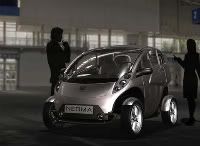Small and Affordable Battery Electric Vehicles

Certainly, re-inventing the way we live and move about will be important to our survival as a species. Great ideas include mixed-use development, greater reliance on mass transit, and car-sharing. But to the degree to which we stay within the passenger vehicle paradigm, it’s hard not to be intrigued with concepts for extremely light, small, affordable, battery electric vehicles, like the EMCycle that I’ve been promoting.
Here’s a related concept from San Francisco-based “LIT Motors” that my friend and colleague Bill Moore of EV World came across.

I once read something that I think applies here.
In the old days before cars, people rode horses for transportation. 1 horse for 1 person. What can we take away from this?
It only takes 1 horsepower to haul your butt around. The rest of the horsepower is to haul your ego around.
Brian, it takes much more power to move yourself at high speeds and protect yourself from the inheirant potential discomforts and damages. That said, there is an inordinate baggage of excess form and power included in most vehicles in the USA today due to ego and misplaced safety concerns. Around here, there are still many people with that one horse per person concept intact and working well. My Geo uses up to about 50 HP, and it is about the smallest car available for reasonable cost. It also gets mileage equal to, or better than most hybrids.
When I can use a PIEV, I will travel with free solar power. That is the goal, when pricing moderates.
While I will admit that we have moved beyond the point where 1 horsepower is enough to power a vehicle given the conditions we must use them in, the statement does bring into stark contrast the difference between what we have and what we really need. Another thing that brings that stark contrast to light is the fact that I live in a place where I can see, in literally one single eyeful, an Amish cart with 4 people in it being pulled by one horse and the biggest pickup truck you can possibly imagine with dual rear wheels with flared fenders and all the options which I am sure gets the worst possible mileage being driven by one person. While the Amish buggy will never get on the highway, they will load it up with all the supplies they buy. On the other hand I almost never see anything in the beds of those giant pickup trucks.
Brian,
Romantic visions of an Amish type society, just don’t work. outside of the protection of US Civilisation, the Amish would perish.
The whole concept of civilisation, is based on a continual revaluation of surplus. No surplus, no civilisation!
Society is very interconnected and extremely complex. just because you don’t see the value of a particular aspect doesn’t mean it can be disposed of arbitrarily.
Each element of our industrial society, is as interwoven as the most complex eco-system.
Utopian dreams are just that, Utopian!
I am not advocating a return to Amish style living but I think we can and should move substaintially away from everybody owning a monster truck when a plug in hybrid or pure electric automobile will do and generally living a more efficient and energy frugal lifestyle. This is well within our technology and is more affected by a change in attitude and lifestyle.
As far as surplus goes, it seems to me that the thing driving this conversation is a lack of surplus and that lack of surplus is caused in large part by blatant waste. Does that then imply an impending collapse of civilization due to lack of surplus? We are in no position to survive an event like Iran choking off the oil supply route. We scarcely survived the last time they waged an embargo against us and we didn’t import near as much oil then as we do now.
I am not looking for Utopia here, just the application of some thought and efficiency in the ways we use energy and a move away from the thought that the only way we can get energy is by lighting stuff on fire.